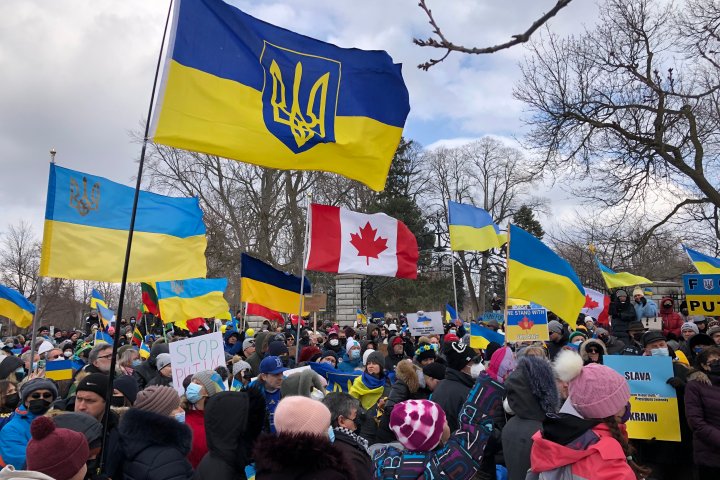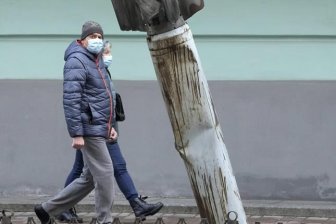
Canada will send anti-tank weapons and upgraded ammunition to support Ukraine‘s fight against the violent and unprovoked invasion launched by Russian President Vladimir Putin.
Prime Minister Justin Trudeau made the announcement on Monday, adding the federal government also plans to prohibit all imports of Russian crude oil — a commodity he said has enriched Putin and the Russian oligarchs surrounding him.
Canada previously sent $7.8 million worth of lethal aid to Ukraine but has been pressed over whether the government would do more amid the bloody Russian push into the country.
“Yesterday, we announced that we would be sending new shipments of military supplies, including body armour, helmets, gas masks, and night-vision goggles,” said Trudeau, calling the Ukrainian fighting “heroic.”
“Today, we are announcing that we will be supplying Ukraine with anti-tank weapons systems and upgraded ammunition.”

Defence Minister Anita Anand said those anti-tank weapons systems will be 125 Carl-Gustaf launchers, taken from the Canadian military’s inventory.
Speaking in the House of Commons later on Monday, Anand said Canada was working to deliver at least 100 anti-tank weapons systems and 2,000 rockets in lethal aid to Ukraine “as quickly as possible”.
The manufacturer states that the anti-tank launchers can be used against armoured tanks and against enemies in buildings, as well as close contact.
Trudeau said the government also plans to ban the import of Russian crude oil, which made up just 2.6 per cent of Canada’s imports in 2019, according to Statistics Canada.

He said he has asked the Canadian Radio-television and Telecommunications Commission (CRTC) to review the presence of Russia Today on Canadian airwaves, ss broadcasters begin removing it voluntarily.
Russia Today is a state-controlled platform that registered as a “foreign agent” in the United States in 2017 and has faced longstanding criticisms for airing propaganda and misinformation in support of Putin.

Earlier in the day, the federal government announced that Canadian financial institutions will be barred from transactions with the Russian central bank with the aim of cutting of Putin’s “war chest.”
Deputy Prime Minister and Finance Minister Chrystia Freeland confirmed that also includes the Bank of Canada, which will not be allowed to have any transactions with the Russian central bank.
The Russian ruble dropped 30 per cent against the U.S. dollar on Monday after a weekend that saw Western countries announce several rounds of coordinated economic sanctions aimed at punishing Putin for the invasion of Ukraine.
Freeland billed the moment before the West right now as akin to the battles of World War Two that were fought on the battlefields of Europe and in the air above the United Kingdom.
“This is one of those times and one of those places where freedom confronts tyranny,” Freeland said.
“Dictators, including the Kremlin’s tyrant, often fail to understand democracies,” she added, noting that authoritarian countries tend to regard democracies as “weak.”
“Our very openness to debate and dispute means once we are agreed on a course of action, we are strong and we are united,” Freeland countered.
To the oligarchs who continue to support Putin, Freeland was blunt: “We warned you.”
What about the threat of nuclear war?
On Sunday, Putin ratcheted up a threat of nuclear war by ordering Russia’s nuclear forces on high alert.
That followed rhetoric on Thursday morning as he began the invasion of Ukraine that immediately prompted questions about whether he is willing to launch a nuclear attack.
“Whoever tries to hinder us, and even more so, to create threats to our country, to our people, should know that Russia’s response will be immediate. And it will lead you to such consequences that you have never encountered in your history,” said Putin at the time.
Bob Rae, Canada’s ambassador to the United Nations, told the House of Commons foreign affairs committee on Monday that the West should not be deterred by Putin’s threat.
He said it is a “tactic” being used to try to scare off the West.
Trudeau acknowledged in the press conference that the question of Putin’s willingness to use nuclear weapons is being discussed by G7 and NATO leaders, but that no one is budging.
“We had a direct discussion about this among allies this morning,” he said.
“We are firm and determined to continue to stand strong together in defence of democracies. We will not look to provoke, we will not look to escalate. But we will stand in defence of freedoms that Canadians and Americans and Europeans and people around the world have fought to preserve.”
The hope remains that Russia will de-escalate and that Putin will back down, Trudeau added.
“Because we will not be backing down on the economic measures and sanctions that we have put forward.”
Anand called Putin’s rhetoric “highly irresponsible and bellicose.”
She emphasized that Canadian troops are not in Eastern Europe on combat missions but are focused on deterrence and defence, which are core principles of the NATO military alliance.
“We also stand ready, of course, with our NATO allies, if there were to be a breach and an occasion to invoke Article 5,” Anand said.
“An attack on one is an attack on all.”

© 2022 Global News, a division of Corus Entertainment Inc.


